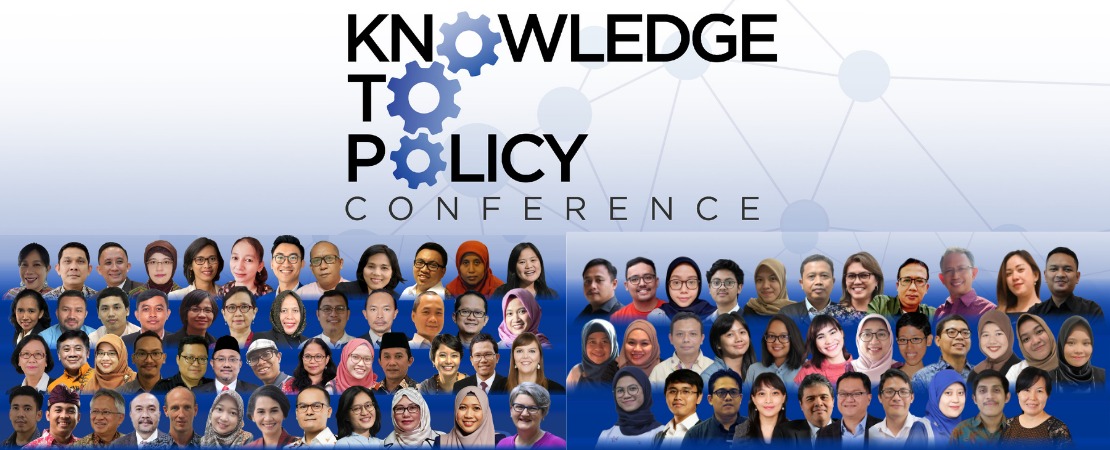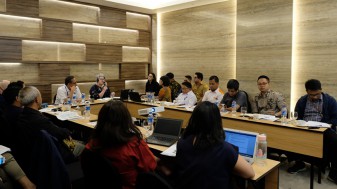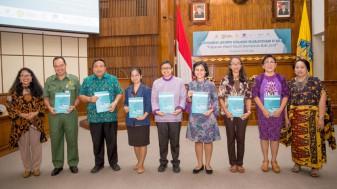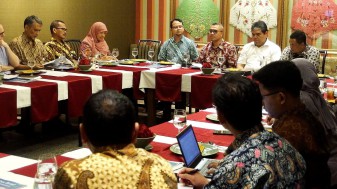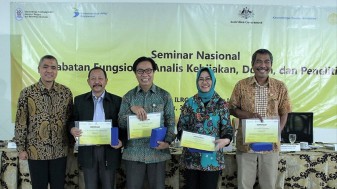In order to produce the appropriately targeted public policymaking required to achieve the vision of Golden Indonesia 2014, quality knowledge input is needed. Thus, having a research climate that is able to support collaboration and ensure research independence is a crucial requirement.
The importance of knowledge integration in the policymaking process was the main theme of the Knowledge to Policy (K2P) Conference, held from 22–23 March earlier this year. This conference was held as a series of closing activities for the Knowledge Sector Initiative (KSI) Program. The conference, which was livestreamed on Katadata’s YouTube channel, was opened by the launch of a book entitled ‘Journey of Change for Knowledge Sector Initiative Partners’ or Perjalanan Perubahan Mitra Knowledge Sector Initiative, containing a collection of articles regarding the journeys of KSI’s partners in processing knowledge into policy.
KSI began its activities in Indonesia in 2013. For almost a decade, KSI has implemented many programs to address the complex issues facing Indonesia. KSI’s programs have focused on subjects such as quality policy research and effective communication, larger and better budget allocation for policy research, and better data and information management, availability, and accessibility for policymaking.
Simon Ernst, the Counsellor on Development Effectiveness and Sustainability, Australian Embassy, opened the series of events. He stated that the Australian Government is very happy to support the Indonesian Government in developing knowledge-based policies. The think tank organisations in Indonesia that have partnered with KSI have so far produced more than 80 evidence-based policies, both at the central and local levels.
There were nine ‘Talk Room’ webinar sessions and six ‘Meeting Point’ presentation sessions during this conference. These sessions discussed various themes, including economic transformation, the green economy, health, education, inclusive policy governance, data management, and the research climate. There were a total of 86 speakers and discussants involved, including government representatives, academics, and representatives from the 16 think tank organisations that have partnered with KSI.
In Talk Room 1, for example, the Deputy for Economics of the Ministry of PPN/Bappenas, Amalia Adininggar Widyasanti, and the Deputy for Development Funding of the Ministry of PPN/Bappenas, who was also the Chair of the Development Working Group G20, Scenaider Clasein Hasudungan Siahaan, conveyed their keynote speeches. Both mentioned the importance of strategies for post–COVID-19 economic transformation, from leaning on the extractive sector to basing more decisions on scientific evidence. The development of digital platforms is expected to promote this economic transformation.
The Executive Director of the Center for Strategic and International Studies (CSIS), Yose Rizal Damuri, who participated as one of the discussants, said that a CSIS study in 2019 found that the use of digital technology can increase economic growth by a minimum of one per cent. However, using digital technology is not without its risks. A number of studies have shown that the use of digital technology can alter job structures. In addition, there are some groups who receive greater benefits from its use compared to other groups, making it non-inclusive. Thus, there are three things that we need to consider so that the use of digital technology can promote inclusive development, namely infrastructure availability, improved digital skills and literacy, and enabling a regulatory framework.
In addition to the representative from CSIS, three other panellists, namely the representatives from the Institute for Policy Research and Advocacy (ELSAM), The SMERU Research Institute, and the Committee for Monitoring the Implementation of Local Autonomy (KPPOD), conveyed their responses to the same issue based on studies conducted by their respective institutions. Hence, one theme was examined from various perspectives, enriching the discussion on the policy formulation process. A similar pattern was also used in other sessions. This demonstrates the critical importance of collaboration in evidence-based policymaking, which ensures that no stone is left unturned.
Policy Memo
The importance of collaboration served as the primary topic of discussion in Talk Room 9. Starting off the discussion, the Advisor for the Center for Innovation and Policy Governance (CIPG), Yanuar Nugroho, underlined that aspects of collaboration were brought up in all eight of the other K2P Conference Talk Rooms, and were discussed prior to the conference through focused group discussions. To demonstrate how crucial collaboration is, 18 independent research institutes (LRIs) presented their recommendations through the ‘Joint Memo of 18 Policy Research Institutes’.
In explaining the memo’s content, Yanuar, along with the Secretary of The SMERU Institute, Heni Kurniasih, asserted that multiparty collaboration is essential to addressing various challenges and issues through appropriately targeted policymaking. In developing policies, the presence of LRIs can complement the role of the National Research and Innovation Agency (BRIN), especially in social-humanity research. Therefore, an enabling policy framework is needed. The presence of a policy framework that provides room to collaborate and ensures research independence will create a conducive research climate, which will positively contribute toward an appropriately targeted evidence-based policymaking process.
There are four recommendations presented in this memo. The first is the need for a policy to protect and ensure independence for researchers. The second is for this policy to be enshrined in a regulatory framework, derived from the Law on National Science and Technology System (UU Sisnas Iptek). The third is for this policy to be implemented in an institutional framework referring to UU Sisnas Iptek. The fourth is the need to stipulate an accountability mechanism for this policy.
The Acting Deputy of the Research and Innovation Facility of BRIN, Agus Haryono, explained that as a funding agency, BRIN provides funding for research and innovation activities. Currently there are eight types of research facility schemes offered. These schemes will continue to grow in the future. In addition, BRIN has developed an implementing regulation on ethical clearance, including permits for foreign researchers. ‘We hope these regulations we are developing will not make it difficult for researchers, because we need as much collaboration as possible with various parties,’ he explained.
The Head of the Social and Humanity Research Organisation Program of BRIN, Trina Fizzanty, said that BRIN will use its strategic role in bridging collaboration between itself and external researchers, including with LRIs. ‘We see LRIs as a national asset, because they are not only working from the dissemination side of the knowledge to policy process, but also produce knowledge. Collaboration is essential so that we can provide solid evidence for policymakers,’ she said.
Research independence is an important factor in producing accountable knowledge. Ultimately, government institutions and think tank organisations need to play their respective roles and establish collaboration to improve research quality in Indonesia. Independence and collaboration are key aspects to shaping a conducive research climate for Indonesia’s future.

